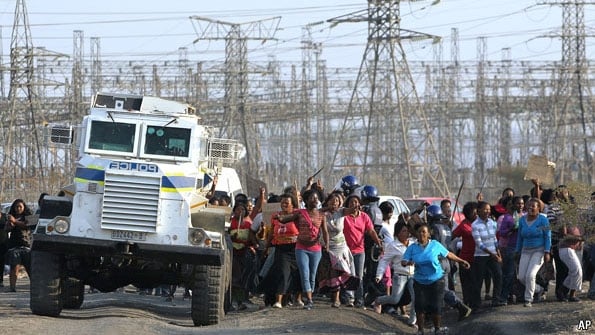
Protesting mineworkers clash with police forces in Marikana, South Africa, on Aug. 16, 2012. Photo source: AP
After recently covering Ethiopia (here and here), I thought I’d stay in Africa for this article. I want to look at two nations with a wide space between them in terms of geography, culture, political ideology and democracy (i.e., government) itself. Basically, they’re as far apart from each other as you can be in Africa, literally and figuratively: South Africa and Egypt.
South Africa’s stable democracy since the downfall of apartheid has been one of the continent’s greatest success stories. Egypt’s is still in its nascent stage, and everyone is anxiously watching to see what happens and whether it will be good or bad. Recent major events have provided some interesting insights on the state of democracy in the twp countries.
South Africa
The government of President Jacob Zuma has come under criticism for its recent (mis?)handling of a miners strike in the northwest city of Marikana. On August 16, confrontation between protesting workers and police spiraled out of control. When the smoke cleared 34 miners lay dead and over 200 arrested and in police custody.
Reactions have been strong from all sides. Police claim they came under attack from angry protesters, and opened fire strictly in self-defense. Spokespeople for miners of course say the attack was unprovoked; some are even calling for Zuma’s and the national police minister’s resignation. The tragic event has been likened to brutal government crackdowns under apartheid. Though South African constitutional law scholar Pierre de Vos points out one crucial difference:
“No matter how wrong-headed and opportunistic our leaders appear to be and no matter how bloody-minded and uncontrollably violent our police have acted, they remain part of a democratic state whose government can easily be voted out of office at the next election if us voters decide that we do not like what the government party has become and what it is doing and saying (or not doing and saying).”
What does this incident say about South Africa’s police force, and its democracy? The police are supposed to protect the people, but where are the boundaries? Who should take responsibility for the killings? How should the government respond (Zuma has promised a state inquiry)? And does government regulation of the mining industry–which some call “arbitrary and unpredictable”–need to be adjusted (and strengthened)?
Should the focus be on assigning blame, or trying to rectify the conditions that led to the incident so it doesn’t happen again? In other words, would it better for South Africa to look backward or forward?
As you can see, the killing of protesters raises serious and difficult questions about the nature of South Africa’s democracy. Its response to this tragedy will say a lot about how strong that democracy is.
Egypt
Much apprehension accompanied the selection of Mohammed Morsi as Egypt’s first democratically chosen president. No one know exactly how his government would look and how democratic it would be. But he recently took a strong stance against Egypt’s military establishment, which many see as a very positive sign.
Even after Hosni Mubarak left office, a number of military leaders loyal to him stuck around, “coexisting uneasily with a gaggle of strutting revolutionaries,” as colorfully stated by The Economist. Morsi took care of that on August 12, summarily dismissing several key Mubarak allies. He also revoked a military order that provides generals with special political privileges.
Additionally, in a symbolic but important step, Morsi publicly declared himself leader of Egypt’s military forces. This puts Egypt in line with most democracies in giving control of armed forces to an elected political leader. It is also telling that this announcement was accepted by Egyptians with little objection.
Many challenges still lie ahead of Morsi and Egypt’s burgeoning democratic government, including drafting a new constitution. But at least thus far, Morsi has shown considerable restraint and deft decision-making in a position where not doing so would have been entirely unsurprising. His bold move to sweep away key players in Egypt’s military past is quite encouraging, as “no democracy can thrive while the armed forces hold most of the power.”
The stability of the entire Middle East/North Africa region will benefit if he continues down this democratic path.